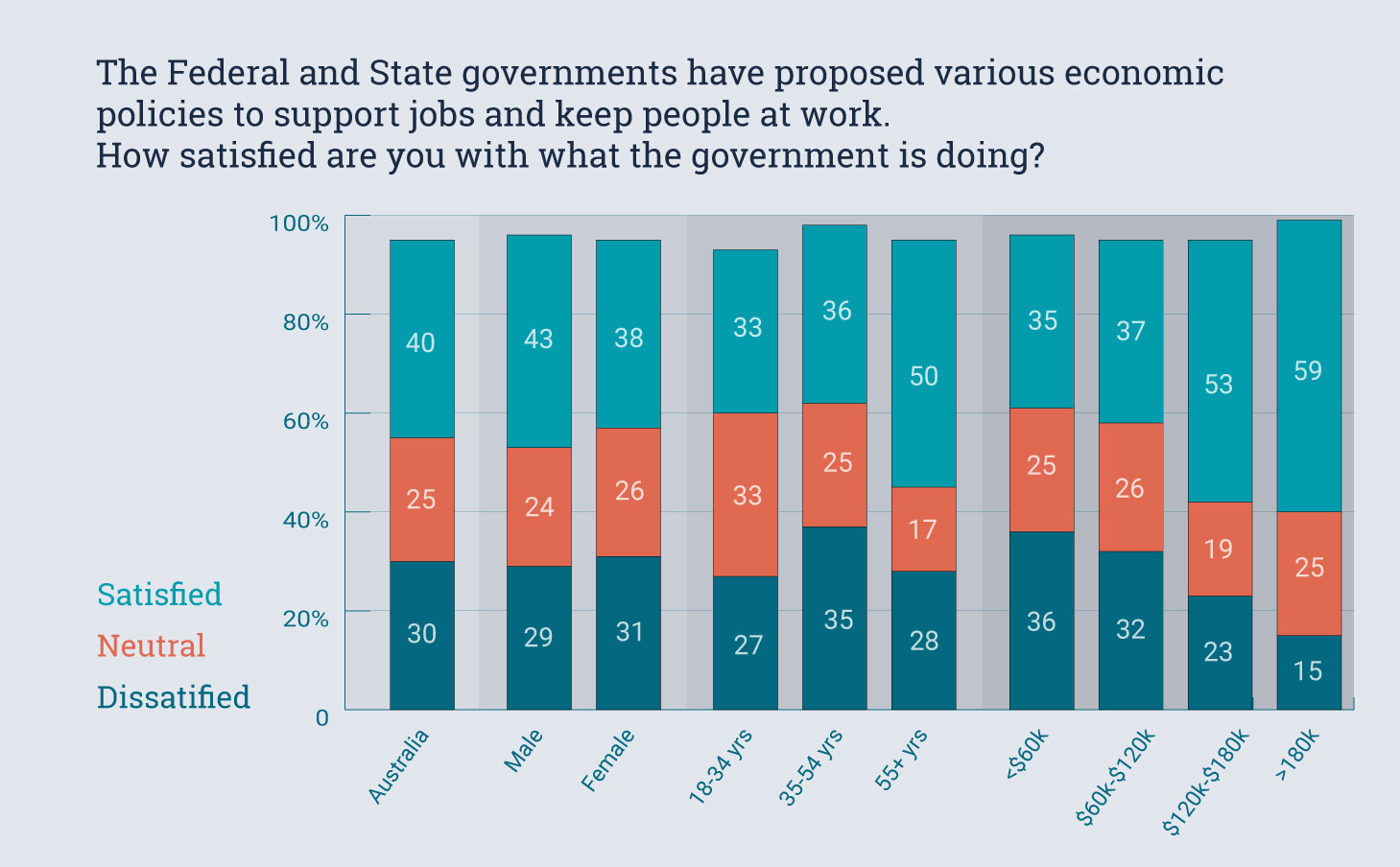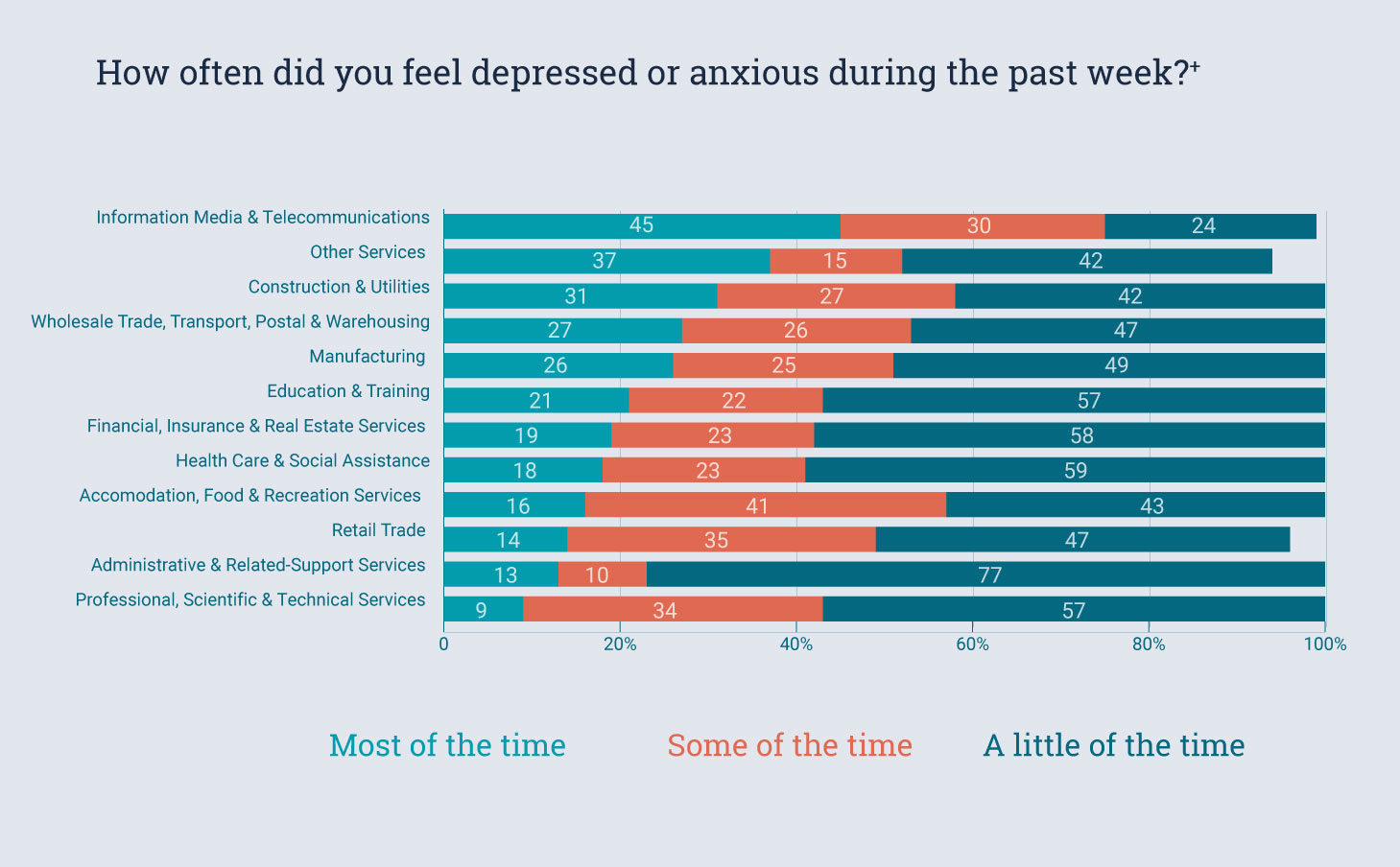The latest Taking the Pulse of the Nation survey was conducted in the week when the Federal Budget was handed down (11 May 2021).
Satisfaction with the government
About one in three Australians remain dissatisfied with government policies to keep people at work.
The proportion of Australians reporting dissatisfaction in May (30 per cent), is higher than the survey average of 20 per cent from April 2020 to April 2021. This suggests lingering concerns about growth and job prospects, especially amongst those aged 35-54 years and those with income below $60,000.

Financial stress and mental distress
About one in three Australians report being in financial stress+ (having difficulties paying for essential goods and services) while one in five report experiencing mental distress++ (feeling stressed or anxious most/all the time). The survey shows that, amongst the employed, some groups have higher than average proportions reporting financial stress and mental distress suggesting that targeted policies are needed to support these vulnerable groups.
Employees on fixed-term contracts and the self-employed are vulnerable to financial stress and mental distress
Employees on fixed-term contracts are vulnerable to experiencing financial stress (48 per cent) and mental distress (43 per cent). For the self-employed, the corresponding proportions are 42 per cent and 36 per cent, respectively (Figures 2 and 3).
Financial Stress and Mental Distress, by employment type (%)
Figure 2*
Figure 3*
Employees in the hospitality and IT sectors are more likely to experience financial stress and mental distress compared to other sectors
The experience of financial stress and mental distress varies across industries (Figures 4 and 5). The hospitality sector has been hard-hit by the closure of borders and the survey shows that 39 per cent of employees working in the accommodation, food & recreation services sector report being financially stressed, but only 16 per cent report experiencing mental distress. In contrast, 36 per cent of employees working in the information, media and telecommunications sector report financial stress and 45 per cent of them report mental distress.
Financial Stress and Mental Distress, by Industry Groups (%)


Vaccine roll-out
To date, 12 per cent of respondents report that they have been vaccinated, but one in three Australians are still unwilling to be vaccinated or do not know if they should be vaccinated. For more analysis about the vaccine roll-out, see:
So you don’t want the COVID-19 vaccine? Here’s what research shows will change your mind? (by Dr. Dajung Jun and Professor Anthony Scott) and Why is Australians’ willingness to be vaccinated falling, and what can we do to increase it? (by Professor Anthony Scott)
* The survey contains responses from 1200 persons, aged 18 years and over. The sample is stratified by gender, age and location to be representative of the Australian population. Note that the percentages do not sum to 100; the proportions in the “don’t know/refused” category, are small and have been excluded from the figures.
+ Financial stress refers to the situation of having difficulties paying for essential goods and services while financial vulnerability refers to being in financial stress or making ends meet.
++ The question about feeling depressed is about assessing symptoms/experiences and not about assessing the presence of a clinical diagnosis or disorder. The responses are calibrated on a 5-point scale covering: all, most, some, little, none of the time.
This report was written by Professor Guay Lim.
© The University of Melbourne – Melbourne Institute: Applied Economic & Social Research, 2021. This work is copyright. The material may be reproduced and distributed for non-commercial purposes only, subject to the inclusion of an acknowledgment of the source(s).